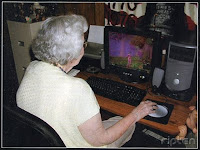 Game Usability Review
Game Usability Review
Braid's great.
Positives
Introducing controls-

As well as being conceptually interesting Braid gradually introduces the game controls very well throughout the first level. It is essentially a training mode built into the game itself – there is no pop up or voice over explaining the controls. The required controls are simple placed on the screen near the obstacle:
Players are left to discover the controls themselves.
Feedback-
Braid also gives great ambient feedback. When reversing time a sound effect is used, the music reverses and the whole colour scheme, including the background changes. Clear feedback is one of the key features of a casual game.
Casual games as a whole-
In order for a casual game to succeed, there are a few restrictions it must place on itself in order to appeal to the casual gamer market. Braid does all of these well:
Less punishing – errors are easily fixed through rewinding time
Less complex – the control scheme is simple (control dimensionality of 3.5). Braid uses wasd controls for movement. This is fairly complex for a casual game, but I shall be returning to this topic at a later date…
Shorter – the game can be completed fairly quickly
Simpler – the games controls are simple, and the most complex aspect is the time travel
Less open ended – the only thing that is possible is to go through the game and collect the puzzle pieces
Clear feedback – it’s clear when rewinding time, and reminders of the controls appear on the screen whenever the game is played (not just on the first levels)
Negatives
There really is very little wrong with it! It seems mean to poke holes, but then again that's my job...
It could be argued that even when you work out the solution to some of the puzzles you are still forced to attempt the solution several times to succeed. Often seemingly completing the puzzle by chance. Essentially the game requires very precise movement and time control. Such precision implies the game anticipates being used by a hardcore gamer, as these are not the skills casual gamers posses.
Also – some of the puzzles are quite hard, there is little/no clues anywhere in the game (even the official game walkthrough tells you not to use any external help – to solve the problems on your own). If this game really was aimed at the casual gamer as well as hardcore, then more help should be used – clues that gradually reveal over time, or hints that appear after a certain number of failed attempts. So those players struggling are helped through the process.
So - is Braid a casual game?
I don't think so... Why? Especially after talking about how Braid is a great casual game? I believe Braid is a
hardcore casual game - it's a casual game for hardcore players. This explains the high difficulty and high skill level required to solve the puzzles.
It's success stemmed from taking a good hard look at the successful casual games on the market and applying findings to a game aimed at the hardcore. The result? A great game...
The implications? Gamers like casual games too, and lessons can be learned from both ends of the game spectrum.


